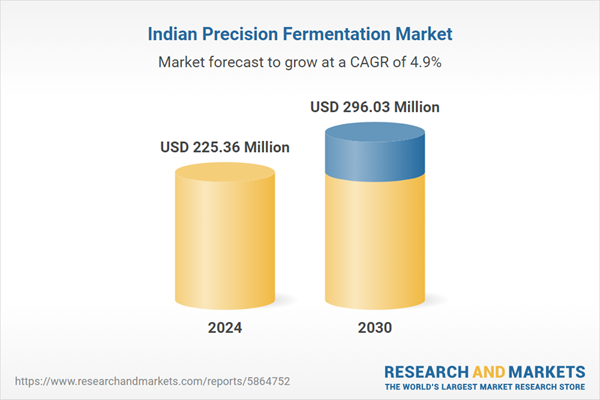Speak directly to the analyst to clarify any post sales queries you may have.
10% Free customizationThis report comes with 10% free customization, enabling you to add data that meets your specific business needs.
Additionally, the focus on food security in India is intensifying, driven by population growth, climate change challenges, and resource constraints. Precision fermentation offers a method for producing high-quality proteins and other essential nutrients more efficiently and sustainably, addressing the nation’s growing nutritional needs. With the ability to manufacture these products in controlled environments using fewer resources, precision fermentation presents a viable solution to the country’s future food security concerns.
The precision fermentation market in India holds significant promise, particularly in the food and beverage, pharmaceuticals, and agriculture sectors. As consumer preferences increasingly favor sustainable and health-conscious products, demand for precision fermentation-based solutions is set to rise. Furthermore, growing interest from both domestic and international investors in India’s biotech sector is likely to spur continued innovation and market expansion.
Key Market Drivers
Growth of the Agriculture Sector
The agricultural industry is a major driver of the India precision fermentation market, as the increasing demand for sustainable practices and plant-based products accelerates the adoption of biotechnological solutions. Agriculture is a critical sector in India, providing livelihoods to approximately 55% of the population. India is a global leader in the production of various agricultural products, including milk, pulses, spices, and fruits.With its vast agricultural land and high levels of production, India is well-positioned to leverage precision fermentation for sustainable food production. This technology, which utilizes microorganisms to produce high-value ingredients such as proteins, enzymes, and vitamins, is gaining traction for its ability to provide sustainable alternatives to traditional farming practices. As India’s agricultural landscape evolves, precision fermentation is emerging as a key tool in addressing food production, sustainability, and resource efficiency challenges.
A major trend within this sector is the growing demand for plant-based alternatives to animal-derived products. As awareness of health, sustainability, and animal welfare issues increases, more consumers in India are shifting towards plant-based food options. Precision fermentation offers a viable solution for producing plant-based proteins, dairy substitutes, and other functional ingredients with minimal environmental impact. This change in consumer behavior is driving investments and innovations in precision fermentation technologies, making them increasingly relevant to the agriculture sector.
Key Market Challenges
High Initial Investment Costs
The high initial investment required for precision fermentation infrastructure is a significant challenge. Setting up facilities involves significant capital expenditures on specialized bioreactors, fermentation tanks, and advanced laboratory equipment. Moreover, the technological complexity of precision fermentation necessitates investment in state-of-the-art tools to maintain product quality and optimize production. Companies must also invest in software, automation systems, and AI/ML-driven tools to monitor and control the fermentation process. These investments are crucial but often prohibitively expensive for early-stage companies.Additionally, the precision fermentation industry is research-intensive. The development and refinement of fermentation strains, optimization of microbial production methods, and scaling of the technology for commercial use require substantial investment in research and development. Companies must continually invest in scientific expertise and the iterative process of refining fermentation processes, adding to the high upfront costs.
Key Market Trends
Rising Demand for Alternative Proteins
The growing demand for alternative proteins is a significant trend influencing the India precision fermentation market. As consumers become more health-conscious and environmentally aware, they increasingly seek sustainable, plant-based, and animal-free food options. Products like OZiva Organic Plant Protein, which provide a complete plant-based protein along with essential amino acids, exemplify this trend. Precision fermentation is emerging as a cutting-edge solution to meet the evolving demand for alternative proteins by enabling the production of high-quality proteins that mimic the taste, texture, and nutritional profile of animal-derived proteins without the need for livestock farming.This shift toward plant-based diets is driven by growing concerns about the health risks of excessive meat consumption, as well as the environmental impact of animal farming. As Indian consumers seek healthier food options with a lower environmental footprint, precision fermentation offers a compelling alternative by providing sustainable, high-nutrient protein sources.
Key Market Players
- String Bio Pvt Ltd
- Phyx44 Private Limited
- Novozymes South Asia Pvt. Ltd.
- Perfect Day India Pvt. Ltd.
- Laurus Bio Private Limited
Report Scope
In this report, the India Precision Fermentation Market has been segmented into the following categories, in addition to the industry trends which have also been detailed below:India Precision Fermentation Market, By Microbe:
- Yeast
- Algae
- Bacteria
- Others
India Precision Fermentation Market, By End User:
- Food & Beverage
- Pharmaceutical
- Cosmetic
- Others
India Precision Fermentation Market, By Region:
- North India
- East India
- West India
- South India
Competitive Landscape
Company Profiles: Detailed analysis of the major companies present in the India Precision Fermentation Market.Available Customizations:
With the given market data, the publisher offers customizations according to a company's specific needs. The following customization options are available for the report.Company Information
- Detailed analysis and profiling of additional market players (up to five).
This product will be delivered within 1-3 business days.
Table of Contents
Companies Mentioned
String Bio Pvt Ltd- Phyx44 Private Limited
- Novozymes South Asia Pvt. Ltd.
- Perfect Day India Pvt. Ltd.
- Laurus Bio Private Limited
Table Information
| Report Attribute | Details |
|---|---|
| No. of Pages | 85 |
| Published | March 2025 |
| Forecast Period | 2024 - 2030 |
| Estimated Market Value ( USD | $ 225.36 Million |
| Forecasted Market Value ( USD | $ 296.03 Million |
| Compound Annual Growth Rate | 4.8% |
| Regions Covered | India |
| No. of Companies Mentioned | 2 |









